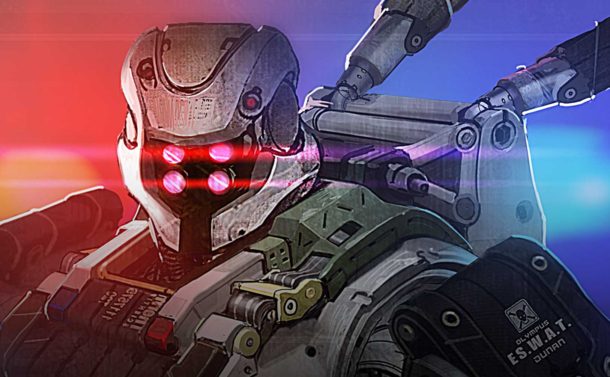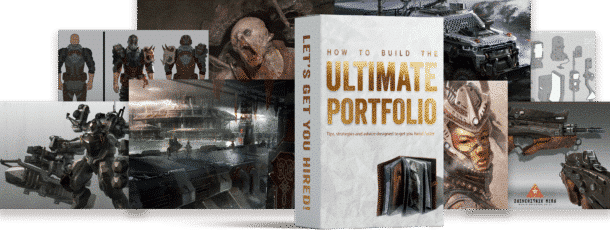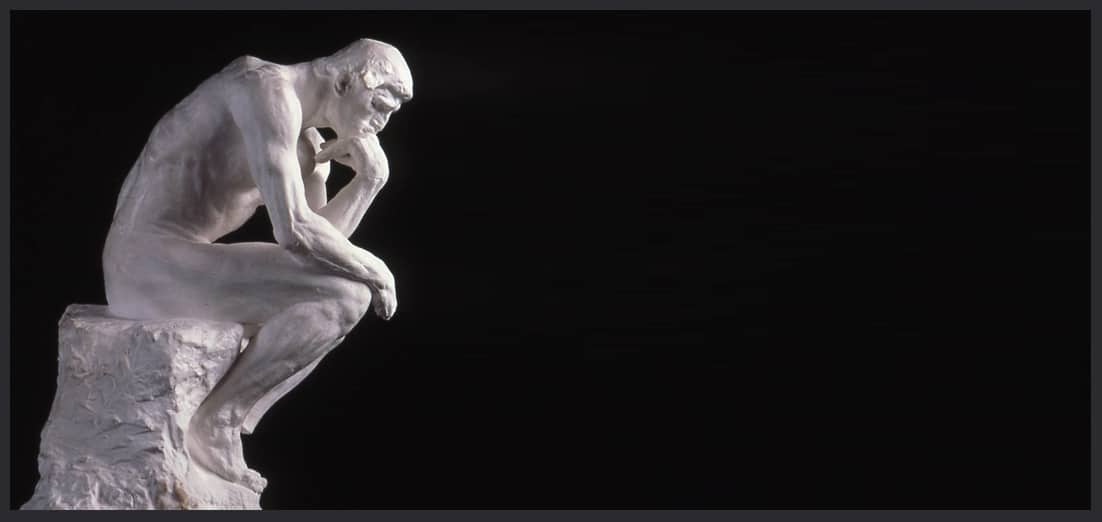
by Eliott Lilly | Apr 27, 2017 | Portfolio Advice, Questions, slideshow
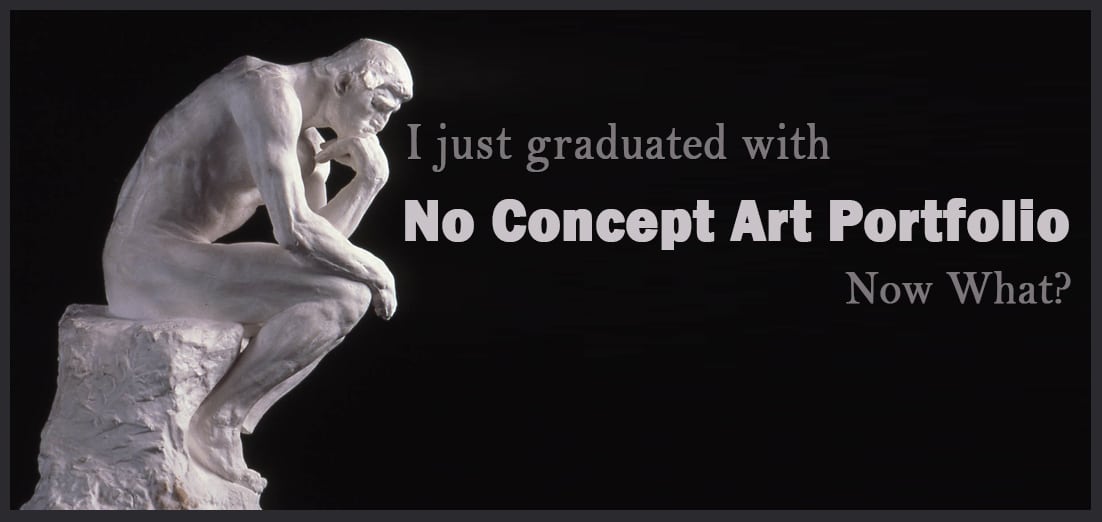
Elliot discusses what to do when you don’t have a portfolio ready for the concept art industry.
Q My name is Ashley and I recently graduated from the University of South Carolina (not an art school). In my last semester I realized that I had a passion to do concept art, but that there was nothing in my portfolio to show my interest. I am concerned that this puts me at a disadvantage to other job applicants who have an art school background. Does this matter in the industry? Does this mean I simply have to work and fight harder to stand out? Also, although it is geared towards the video game industry, could the advice given in your book: The Big Bad World Of Concept Art; An Insider’s Guide For Students also be applied to the animation/movie industry as well?
A Your situation is very similar to my own experience in college, so I know what you are going through. Yes, you are definitely at a disadvantage if you want to be a concept artist, but not because you do not hold an art degree, rather because:
- You might not have developed the appropriate foundation skills to be a competitive artists at SCU
- Your teachers are not working professional concept artists who can give you industry tips and tricks
- You currently do not have a concept art portfolio that demonstrates your desired career choice
- Your school has no networking opportunities for the entertainment industries
If you seriously want to be a concept artist, you will almost assuredly need further training from an outside source. My solution was to go back to school for another two years to really refine my skill set and portfolio. I would suggest you do the same. Attend a concept art focused school or at least attend some online classes. Check out the resources page on the website for our highly recommended choices. Also: I wrote an article on my blog a while back called “Am I in the wrong school?” It offers three really good actionable options that might offer additional solutions to solving your dilemma.
It’s also worth mentioning that you will need to work hard just to be “up to par” with other budding artists looking to get into the industry. THEN you will need to work extra hard to stand out. In fact, EVERY ARTIST (pro and student) has to work hard to stand out in this industry. – That’s a lifetime effort.
Lastly, YES, the advice given in The Big Bad World Of Concept Art; An Insider’s Guide For Students also applies to other professional industries. Since getting a job in any entertainment industry is about the same, you can take what you’ve learned in my book and apply it to that specific area.
Want to help us grow our resources section? If a resource has helped you greatly please e-mail it to me or any suggestions
to: me@eliottlillyart.com. I will be keeping this list updated as I discover new entries. Thank you--
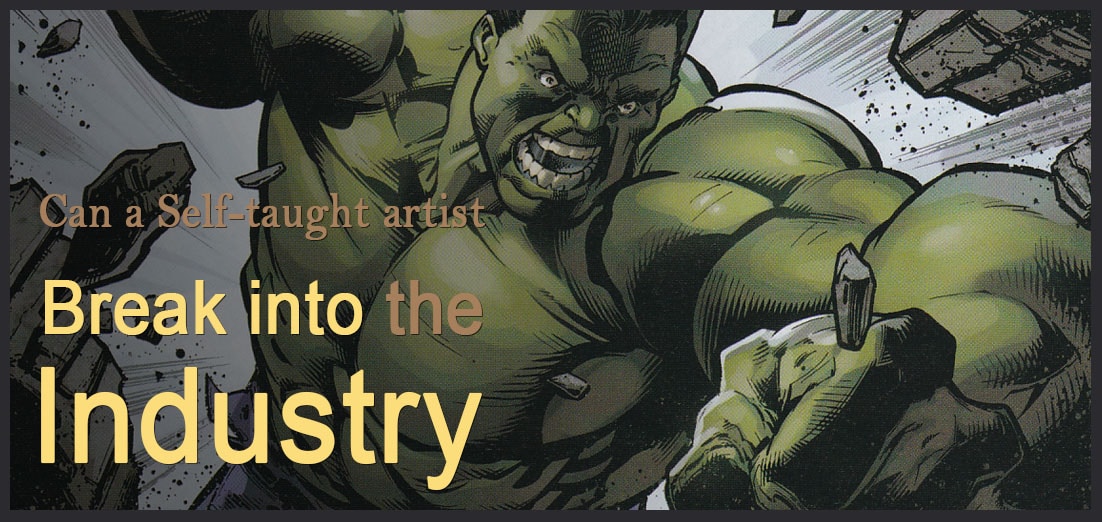
by Eliott Lilly | Apr 25, 2017 | Questions, slideshow

Eliott discusses what it takes to getting your foot in the door as a self-taught concept artist.
Q My name is Carl and I’m a senior illustration major at a loss for how to get a foot in the door. I am not sure how to start taking the next step into the field, and I have no experience networking. I would like to continue pursuing a professional education (ideally in a trade school as you said), but I don’t think I can make that happen financially right now. I’ve been exploring my other options – largely online courses from independent artists like Chris Oatley or CubeBrush. Would you say this route is viable in your personal opinion, or at the very least a good practice to use in the meantime while saving up for a more advanced education? Do you also think it’s possible to catch up with those who have been working towards this for much longer?
A The short answer is: Until you have mastered your craft and your artwork is on the same quality as professionals, you will have a hard time “getting your foot in the door.” Your competition are professionals currently working in the industry (not your peers in school). So, what do you do? I wrote an article on CGChannel.com, discussing some of this, and it might be a good read for you. Check out: 10-questions-to-ask-before-you-apply-for-your-first-art-job/
And, yes, get your education however you can and soak it all up. There are tons of free resources you can start with (see the resources page) and paid ones that will take you even further. These will hold you over for a while, but at some point you will likely need more structure and direct guidance.
At that time, it’s worth reevaluating your finances to see what’s possible. If going to a trade school is still out of the picture, then consider mentorships where you can get direct feedback on your work from working professionals.
If that is still unobtainable, then you can always join forums, and art groups on social media that specialize in feedback and critiques. That will at least get you some feedback, but always take it with a grain of salt, since you don’t know who’s offering it (Is it a professional or a student? – there’s a big difference there).
Playing “Catch up” is a dangerous game that if you aren’t careful, will lead you down a dark hole since there will always be artists better (and worse) than you. Change your thinking to: “Will my work ever be good enough to support me as a professional artists?”… The answer’s usually is: “With enough time and patience, yes.” But, the caveat here is that you need to HONESTLY determine if being a concept artist will still be worth it to you if it takes 10 years to get there. If the answer is “No”, then you should probably find another career and keep art as a hobby.
If I were you, I’d consider writing to self taught concept artists to ask their opinion on this subject. Dan Luvisi and Darek Zabrocki are two super talented artists that I can think of – do some research and find others.
Remember: as long as you are learning, (even if it’s on your own) then you are heading in the right direction. There are no guarantees in art nor is there an easy button – To get better takes time and determination. Seriously. If you prioritize being a professional artist above all else, then it might happen sooner for you. If, however life gets in the way, then it might take longer for you to get where you want to be
Best of luck
Want to help us grow our resources section? If a resource has helped you greatly please e-mail it to me or any suggestions
to: me@eliottlillyart.com. I will be keeping this list updated as I discover new entries. Thank you--
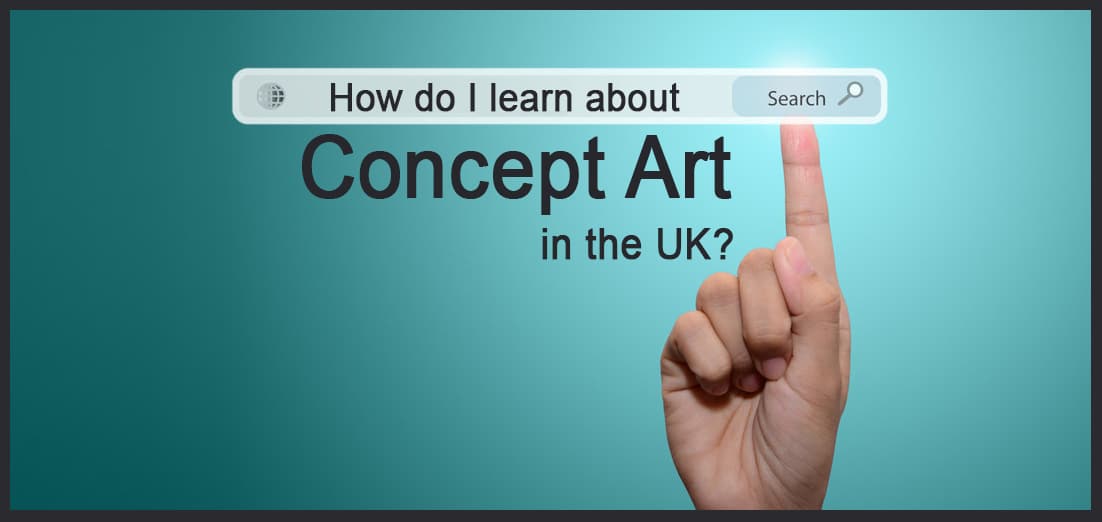
by Eliott Lilly | Apr 20, 2017 | Questions, slideshow
Eliott offers advice for concept art education in a competitive industry and how to prepare for it.
Q I am Charlie, a first year student currently studying BA Games Art and Design – Norwich University of the Arts in the UK. The program however is rather slow pace and focuses little on concept art. The UK is not known for its concept art courses, unless there are courses I’m missing. I could go abroad but going abroad would also present problems. Starting a four year degree seems almost overkill, and being 21 I need to ideally get my life along a bit faster. The big questions are: would a four year degree still be worth it now? Or do I try to find an industry related course in the UK.
A You are correct: Any advice offered would depend on where you are in your artistic development, and where you want to go with your career. So, in that regard, I would need to know more about you, and see some of your work to properly advise you (feel free to send).
In general, however I can tell you that if you have zero traditional art background, then you will likely need at least 5- 10 years of intensive art training to be “good enough” to compete as a professional artist. How did I get to that number?
- 2-4 years of training at an all art college (or program) to develop your foundation skills (nothing fancy, just the basics of perspective, anatomy, color, light, etc).
- 1 year to learn a specific skill set, (like a Photoshop, or a 3D modeling program)
- 2 – 3 years to refine, polish and strengthen your techniques while developing your artistic voice.
Once you have all of that under your belt, you will be better positioned to be competitive in this industry. If that amount of time seems too long, then there are ways to shorten it a bit, but you wills till have to put in the effort and time. You can shave a bit of time in your artistic development by:
- attending an intensive 2 year concept art program at places like FZD, Brainstrom, and other such schools. (these aren’t guaranteed to get you industry ready but will get you closer than a traditional art college since they focus on and specialize in concept art).
- learn multiple things at once (GIVE UP YOUR SOCIAL LIFE to spend every waking minute intensively focused on art)
- Continue to supplement your proper education with constant online tutorials, and training.
Unfortunately, there are no shortcuts with art – you just have to grind your way through it. If you read all of that and your gut feeling was: “Yikes, I don’t have 10 years” then, maybe keep art as a hobby, and pursue something else in the UK. If your gut reaction was: “Yikes, 10 years is a lot, but I can do it sooner!…” then I say PUSH ON. It’s really all about you as a person, your mental determent, what resources are available to you, and what you prioritize in life.
I came across another student who had similar issues as you and wrote about him on my blog. If you haven’t already, I highly suggest you read this article, as his options might help inform your decision making in the future,:
https://bigbadworldofconceptart.com/////user-questions/am-i-in-the-wrong-school/
Best of luck.
Want to help us grow our resources section? If a resource has helped you greatly please e-mail it to me or any suggestions
to: me@eliottlillyart.com. I will be keeping this list updated as I discover new entries. Thank you--

by Eliott Lilly | Apr 17, 2017 | slideshow

Q Benjamin asked a question concerning getting that first job. Can you rely primarily on a really nice portfolio and a degree, while having a sparse resume? Are internships prevalent in the field of the concept artist?
A That first job can be tricky. A sparse resume indicates a lack of experience, which sogame studios will require in order ito be an eligible candidate (they usually require 2 – 3 years minimum). So you may be asking yourself: “well, how do I get that experience if they aren’t willing to hire me?” And that’s the rub.
To answer your question: While it is possible to land those jobs without experience, your portfolio would need to be AMAZING in order for a studio to take a gamble on you. The degree is less important. With that being said, if someone has been considering opting to start a vocational course, sites such as Upskilled could hopefully help make the decision process a lot easier. With more skills added to your resume, hopefully this could boost the application and possibly get one step closer to landing a job without much experience.
I would suggest beefing up your resume; you can do this by using an online resume editor alongside taking on smaller side gigs for legitimate clients. They may not pay very well, but they will show you can work as a professional, with skills like sticking to schedules and timelines, making deliveries and revisions, and understanding the clients’ goals and visions and translating it into the illustration. You can start by making a professional cv that will show potential employers that you are able to stand out from the crowd and come across as a real pro. Making small changes to your resume can be beneficial to your chances of securing the job, but incorporating big changes could hinder it instead. In this day and age, many businesses may decide to enlist the help of somewhere like this Mississippi background check company to help them to verify the accuracy of job resumes, so any lies that you incorporate onto your job application will be noticed and could affect your employment going forward. So, make sure that you take the time to ensure that your resume is accurate. This in itself can help you to stand out from the crowd.
Personally, while still in college, I searched job boards and forums for people in need of art. I got my first job illustrating a cover of someone’s print-on-demand book (which was new technology back then), and a few other small jobs designing logos and other crap. This went on for several months, until I had enough “experience” to land a job with a bigger client making TV pitch ads (none of these were concept art – more so illustration, but it got me the professional working experience I needed). By the time I graduated and it was time to find employment at a video game studio, I already had 2 years of professional art experience. I used that point, along with my solid portfolio, to win over my first video game studio.
A To answer your other question: While I have heard about concept art internships, they are usually few and far between. Be on the lookout for them, but I wouldn’t hold your breath. Of the many concept art peers I have worked with over the years, only one had an internship first, before begin hired full time.
Want to help us grow our resources section? If a resource has helped you greatly please e-mail it to me or any suggestions
to: me@eliottlillyart.com. I will be keeping this list updated as I discover new entries. Thank you--
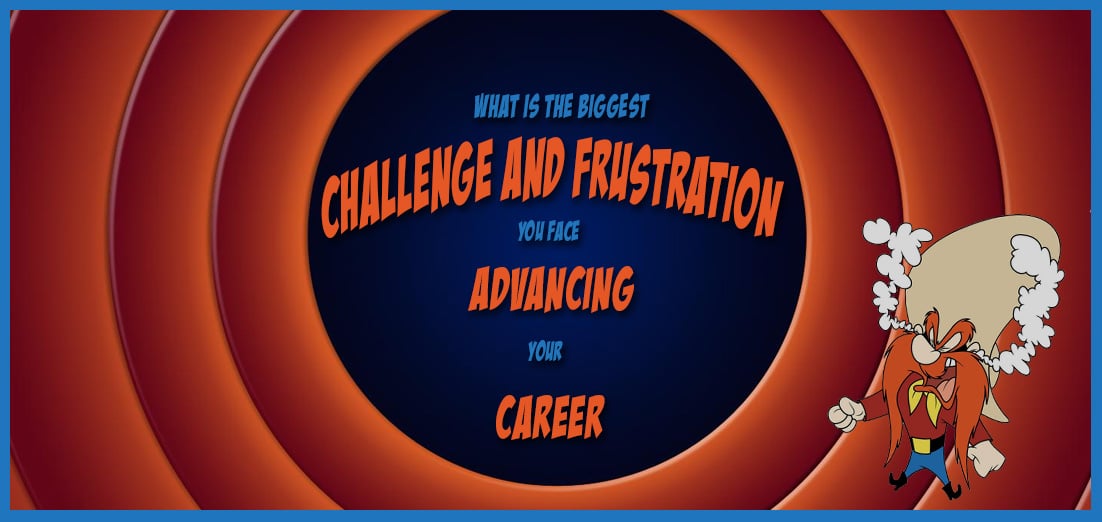
by Hector Ruiz | Mar 16, 2017 | slideshow

What is the biggest challenge and frustration you face Advancing your career?
I was asked this question recently by a professional artist who is doing some research on the subject, and I wanted to explain my answer from my own perspective in several steps. Hopefully some of you can find this informative enough to think about your own situation and goals of becoming a professional artist in the entertainment industry. Enjoy!
?
When it comes to advancing my career as a freelance artist, my biggest challenge or frustration would have to be being the right candidate for the right job. Here?s the explanation broken down into segments of why I derived on this answer.
?
Too many hands in the pot:
As a freelancer, I don’t have as much industry experience compared to some professional artists. I wish I did, I also wish that I had the privilege of hiring an accountant from somewhere like http://daveburton.nyc/taxes-for-freelancers when I need to work on my taxes, but I digress. With the popularity of concept art and illustration for games and film growing, we also have to add all the young and eager artists who are paying to learn the same thing. Now this should not be as troubling because I’ve been preparing myself with a few skills overtime, but now we have more artists flooding the market which in turn makes some companies/studios not care as much about hiring at a certain rate, and we also have the young inexperienced artists who want the exposure so much that are willing to work for less. When we add the incredible amount of artists worldwide, we get into how much money can we pay an artist vs. how much money do we get in return. Again, it boils down to experience and your ability to market yourself as a professional artist.
?
Tools of the trade:
When we talk about learning a software to create the next best and coolest looking thing in the shortest amount of time, concept artists are huge into this. A while back it was Photoshop. Then we got into photobashing, 3D, Keyshot style rendering, and recently, VR painting. Now this shouldn’t matter because all of these are just tools, but in some way it does as studios and clients want to play with the same toys and features setting the trend for the next generation of games, films, shows, or advertisements. Some artists argue that it all comes down to the knowledge you have with design fundamentals. I agree in a big way, but I also know that when you stop learning a tool and stick to your old school way of designing, you can fall behind rather quickly. Unless you’re one of the greats, which seems to find more rarity nowadays, learning a tool will give you an extra edge. If we go back to the first point, you have a vast amount of artists who are also learning these things in order to compete for the same jobs.
?
Experience:
Now, I mentioned before that I didn’t have as much experience as some professional artists who are competing for the same jobs. I have a rather high bar set for myself, as any artist should, and for me it has been important to start working with higher level studios/companies, skipping smaller gigs. In order to combat this, I’ve taken more of a back seat to improve my skills in order to compete at a higher level. When trying to find these higher level jobs, I now run through the trouble of having the skills, but not the experience of working in a studio or with a range of clients. We start the catch 22 argument with you need the experience to work. A way to bypass this could happen by living closer or having more access to smaller studios/companies willing to hire a more inexperience artist in order to coach and propel them to the next level. I also need to add the having the right experience with making and knowing how to handle contracts with clients/studios. This is so important that not knowing how to do it right can have undesirable effects with your work and brand as an artist. There is also the competition against your own teachers and heroes. When you want to play with the big boys, you also have to able to handle yourself against them. This means knowing how to do the right designs quickly and effectively. When you have to compete at the rate of speed of your own heroes and teachers while making things look good and fresh, it can be daunting and frustrating.
?
Location:
In an age where communication is so easy to have worldwide, finding a job as a concept artist is easier than ever. Being freelance usually allows me to work wherever I like, just as Freelance Book Editors as able to as well. For some, having the media presence is a little harder so living in a good location where more jobs are available is key. The challenge I face is finding the right kind of jobs that can be flexible and are willing to accept me as a freelance artist working remotely. I?ve had a few issues where my location created a bit of a problem in landing a job. Again, we can go back to the experience you have as an artist. I have a good friend of mine who is very experienced as a designer on what he does, that he doesn?t need to worry about working on-location. He does tell me that the company wants him to move to their location (the company is in a different state). Living in the right place can definitely affect your chances of finding more opportunities in this industry. Since this is a bit of an issue for me, I have to resort to another challenging topic.
?
Mobility:
How easy is it for me to pack up and go anywhere in order to work on a project? When you have a mortgage, wife, kid, and pets, it can be a little more difficult to plan. Even having to leave your family for contract gigs can be a little hard to take. It seems to be the norm that companies like to hire artists for shorter periods of time in order to test them out and see if they could work well with the rest of the creative team. It?s also a good way to hire someone without having to pay extra benefits. As a business that needs to make money I completely understand, but as an artist having to sacrifice time and money for the greater good, it definitely makes you think about a specific job.
?
Marketing:
So, I have some experience, I?ve learned some tools, but I don?t live in the right place. In order to get around it, marketing seems to be a really good way for competing in the industry. This can be a little tricky as some artists aren?t really trained with business in mind (me included). I?ve had to learn a few things over the years, some as hard lessons. So what?s the challenge? I have to make sure to sell myself as a product to as many venues as I can in order to have the right amount of exposure to find the right kinds of jobs. This requires me to be in tuned with social media and create a presence as without it, no one will even know what I do in my line of work. Creating a presence on these platforms is important if I want to be able to become a successful freelancer and, if you’re at all interested in freelancing too, you can read more here in this helpful guide (I wish I’d had this when I was first starting out!). Sometimes, it may be hard for me to find the time to be able to invest all of my attention to making posts that will encourage people to click on that follow button. I have been encouraged by someone I know to get instagram followers for free by looking into sites similar to Socialfollow. I have to say, this would be a big help to me if I find that I am too busy to get this done. It is something that definitely should be considered by all freelancers as this could become a successful way to be able to build your brand’s awareness. I have to make sure that all of my work is synced with each other on every gallery site I join. I have to keep in mind to write my contact information on every work I put out in case it falls into a producer or director?s eyesight. I also have to keep my resume at hand for anyone wanting to see my credentials. I?ve been told my other artists that a resume doesn?t mean a thing in this business, but I would have to differ when it comes to experience and previously worked clients. Business cards also have to be printed so I can have them ready for any situation. My portfolio website needs to be designed so it captures the viewer right away in the least amount of time. Networking is a big thing when it comes to marketing. If you?re not networking with the right people, you may miss some opportunities. Travelling to conventions is also part of getting the right exposure. There?s more to it, but we?ll keep it for another discussion.
?
Time:
Good old time. I would almost want to name this the number one thing that challenges me and frustrates me on a daily basis. It is definitely a big one. Having to do everything and still have time to relax with friends and family is not easy, and even though it?s pretty much a norm with artists who always strive to stay on edge, it doesn?t make up for the fact that you need an escape to recharge your creative juices. Now, I love art and it is easy for me to forget that there are things around me when I focus on a project, but it can be frustrating when you want to spend time with family and friends while still finding a good amount of time for resting and sleeping. When I was younger, not married, and without a kid, it wasn?t much of an issue. Doing this for too long can also affect your health. This is when time management becomes ever more important. I know people that do it all the time and say they?re fine with 3-4 hours of sleep. I just don?t see the benefit of overworking yourself especially when the goal of a lot of artists is to create their own work and having the time to relax more, without worrying about what the studio/client needs.
?
Game and Film Industry:
As much as I love what I do as an artist, and I wouldn?t see myself doing any other career path, some of the frustration does originate from industry practices. Well established artists don?t have to worry about this so much, but I don?t think there is anyone who wouldn?t agree with me when it comes to the way the industry, studios, and clients handle business. Again, businesses are out to make a profit on a product. If they don?t do it well, there won?t be a successful product to sell to the public. The problem is the way it is done in relation to artists. I know for this issue to become resolved, there would need to be a huge movement that as of now, I don?t see happening. Job security also deals with this issue. It?s known that in this field you may have to bounce around from studios or clients, with the occasional layoffs. Going back to the experience, this is why it?s also important to become useful to the company, even more than what your job description requires.
?
I do hope this doesn?t sound like a bad rant as I do love the things that come out of the industry. It was seeing and watching movies and games that opened my eyes into this career path. I do hope to become very successful as a concept artist and illustrator and one day create my own IP that would be seen by lots of people. We?re at an age where it is very possible to do and create wonderful things. At the moment though, my focus is on having the right product to sell to studios/clients that will get me the right job. It is very challenging as art can be very subjective and at times very frustrating trying to come up with the best sales pitch that will get you the most views with the right people.
Want to help us grow our resources section? If a resource has helped you greatly please e-mail it to me or any suggestions
to: me@eliottlillyart.com. I will be keeping this list updated as I discover new entries. Thank you--












